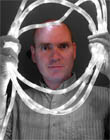|
|
 
|
|
Author
|
Topic: I'm curious to know why many on Film-Tech seem to be so negative on digital cinema
|
|
|
|
|
|
|
Aaron Mehocic
Jedi Master Film Handler
Posts: 804
From: New Castle, PA, USA
Registered: Jun 99
|
 posted 07-25-2008 04:07 PM
posted 07-25-2008 04:07 PM




Let me first preface my remarks with the statement that I have never seen a DLP image, which may also be available in 35mm film, projected onto a screen.
Now with that being said . . .
It is my opinion that many pro-film members of Film-Tech see the dawning of the digital projection age as an end of an era, which, unquestionably, was cinema's golden age. Many respect the history, showmanship, and ambiance of film and those who have worked with film before them. Moreover, they see it as the only true medium in which the progenitors of this form of entertainment envisioned their final product for public consumption. The pro-film people here agree that this is the way it has been done for over 100 years and if it works just as good - if not better - now than it did then, why not stick with it. In short, if it ain't broke don't fix it. The only corallery in all of this is training the right people to handle the film.
The pro-digital elements on Film-Tech also respects what has been written above, but they believe for this form of entertainment to survive in the future, it must look like it belongs in the future. Dirty machines using oil or grease pulling a scratched piece of polyester along sprockets and rollers is not very 21st Century. They too realize the golden age of the cinema is no longer and today's customer wants options a standard whatever-plex can't always provide. For this group it can be as real as Ben Franklin's old statement: "join or die".
My advice in answering that question is to identify who are the pro-film and pro-digital proponents and opponents here on Film-Tech and examine what they say. In my opinion, Brad Miller is probably the most vocal pro-film member here, while Mark Gulbrandsen is the most vocal pro-digital.
The digital role out will encounter its fair share of problems. For one, the down turn in the economy probably put a slowdown on the big wave everybody thought was coming. Furthermore, as many techs I've talked with over the last year have commented, nothing in digital is standardized. Meaning: That soundhead I still use from 1939 still works - and works well. I doubt seriously if the Christie DLP unit manufactured this year will still be in use in 2077. Yet, with consumers demanding more choices and the entertainment market saturated with so many choices film could become irrelevant and a quaint antique from the 20th Century faster than we think. Only time will tell.
| IP: Logged
|
|
|
|
Jesse Skeen
Phenomenal Film Handler

Posts: 1517
From: Sacramento, CA
Registered: Aug 2000
|
 posted 07-25-2008 06:09 PM
posted 07-25-2008 06:09 PM




If I still worked as a projectionist I'd be negative on digital just because it would reduce or eliminate my job. I think that's fair enough.
From a customer standpoint, seeing how badly a large percentage of theater personnel handle film, as well as the crappy quality of some film prints that even the best projectionist can't fix (particularly all the anti-piracy measures), I'd welcome digital if it solved all of those problems. The problem is, it doesn't, at least not at the moment. My biggest issue with DLP is the screen-door effect- the first DLP movie I saw had an obvious grid effect on the screen, especially noticeable with black objects against a white background. This is the sort of thing most people don't seem to notice, but it really looks bad. I was told this was an older DLP setup and the newer ones don't have this problem, but I'll believe it when I see it. The only other DLP show I've seen since then was animated and in 3-D so it was harder to look at it too closely, but the 2-D live-action trailers still had a video-like effect to them. If I want to watch video, I can do that at home.
If they can get DLP to equal film done right, more power to them, but if they can't get it absolutely PERFECT I'll see it as a step backwards.
| IP: Logged
|
|
Cameron Glendinning
Jedi Master Film Handler

Posts: 845
From: West Ryde, Sydney, NSW Australia
Registered: Dec 2005
|
 posted 07-25-2008 06:20 PM
posted 07-25-2008 06:20 PM




My opinion on 2k digital cinema is pretty simple,
Its expensive, and does the job no better than well presented 35mm. 3d excluded.
Digital presentation is the future and personally I think that it wont be too much longer until the standard of digital presentation will be vastly better than avalable today.
With home standard now having a 2,000,000 million pixel resolution through blu ray disc, 1080p with its grid 1920x 1080 compared with 2k D cinemas 2 000 000 plus pixels 2040 x 1080
grid.
At the same time cinema design has changed, most new cinemas feature huge screens that rarely allow the audience to get 2 screen hights away.
Personally I think that the best 35mm image is viewed from between 2-5 screen hights away from the screen. Therefore only the back few rows and the minority of seats have a truely great image!
Now many cinemas do not have 35mm done right and the switch to 2k digital for these cinemas should be done immediately. How long will it take for people to realise that there new high definition tv is better than their local cinema?.
This is the first time in the history of cinema that the home product comes close to matching the quality of cinema image. This is genuine compitition unseen before! Last time cinema was slightly similar in the 50's cinemas were forced to compete by introducing wide screens and multichannel sound.
Cinemas who currently do film properly, use filmguard etc probably will get the best bang for your dollar by waiting for the developing digital technology to improve with a higher resolution.
I look forward to the day that I can go to my local monster screen multiplex and see a movie with a standard of image that exceeds todays 35mm, sitting closer to the screen and enjoying the more immersive feel that the higher resolution will allow!
Anyone remembering 70mm knows that better than 35mm isn't new.
[ 07-26-2008, 04:54 PM: Message edited by: Cameron Glendinning ]
| IP: Logged
|
|
|
|
|
|
Geoff Jones
Jedi Master Film Handler

Posts: 579
From: Broomfield, CO, USA
Registered: Feb 2006
|
 posted 07-25-2008 08:43 PM
posted 07-25-2008 08:43 PM





My thoughts as a movie-goer:
I don't like digital because the picture quality of the current tech isn't as good as film done right. The digitally projected movies I've watched looked bad to me. Contrast was poor. Jagged edges were visible. (I will grant that the image was rock-solid, but I saw Back to the Future in 35mm on Wednesday, and it was also rock-solid.)
4k seems like it will get close to the quality of 35mm, from what I've read, but it has big problems too.
Screen size is important to me. I want my dinosaurs to be life-size. I want to duck with starships fly over. With the 4k projectors only rated to 40' screens, that just won't cut it.
Also, my experience has shown me that most cinemas do a terrible job of accurately advertising their equipment. I have zero confidence in being able to figure out which theatres (much less which individual auditoriums) will be projecting 4k instead of 2k.
Finally, I worry about the financial risk of this transition. Will all those theatres that have paid tens (hundreds?) of thousands of dollars on 2k gear be able to afford to upgrade to 4k? To 8k? Will they be stuck with crappier-than-film 2k projectors for the forseeable future?
The whole thing seems so pointless to me. The cost of properly operating and maintaining 35mm equipment is a tiny fraction of the cost of a new digital projector. All it would take is a theatre that gives a damn. (And they are out there, and they do a fantastic job.)
And there are SO many problems at most theatres that digital doesn't begin to fix. Marks (or thrown food) on the screen. Talking patrons. Constant width masking. Improper volume. Annoying pre-show commericals and slides.
I just don't get it. The main purpose of digital projection seems to be to sell expensive new hardware (which is exactly how the electronics industry maintains its growth) and eliminate print costs.
That's my perpsective, anyway. I hope it answers your question.
Geoff
| IP: Logged
|
|
|
|
|
|
|
|
|
|
|
|
|
|
All times are Central (GMT -6:00)
|
This topic comprises 18 pages: 1 2 3 4 ... 16 17 18
|
Powered by Infopop Corporation
UBB.classicTM
6.3.1.2
The Film-Tech Forums are designed for various members related to the cinema industry to express their opinions, viewpoints and testimonials on various products, services and events based upon speculation, personal knowledge and factual information through use, therefore all views represented here allow no liability upon the publishers of this web site and the owners of said views assume no liability for any ill will resulting from these postings. The posts made here are for educational as well as entertainment purposes and as such anyone viewing this portion of the website must accept these views as statements of the author of that opinion
and agrees to release the authors from any and all liability.
|

 Home
Home
 Products
Products
 Store
Store
 Forum
Forum
 Warehouse
Warehouse
 Contact Us
Contact Us




 Printer-friendly view of this topic
Printer-friendly view of this topic




















